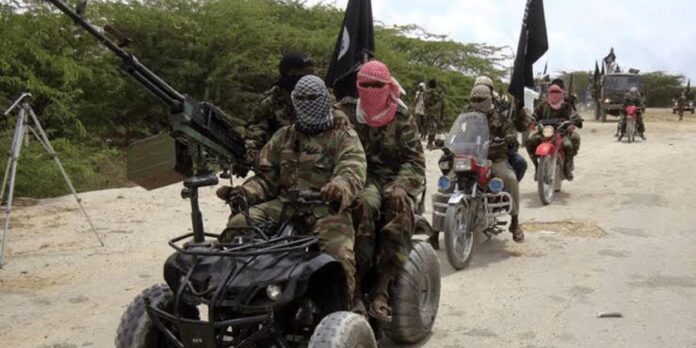The fragile security at Nigeria’s borders was exposed again as a newly formed terrorist group, Lakurawa, struck in Kebbi State, leaving two immigration officers and a civilian dead. The attack, which occurred on Saturday at the Kangiwa border in the Kangiwa Local Government Area, underscores the increasing threat posed by insurgents in the region.
Eyewitnesses revealed that the officers were stationed near a site designated for the installation of a transmitting mast when the gunmen attacked. The mast, which was intended to enhance border security by detecting unauthorized movements and transmitting data directly to the Nigerian Immigration Service (NIS) database, was seen as a critical measure to curb illegal cross-border activities.
A Coordinated Strike
Sources in the community described the attack as swift and brutal. “The terrorists came heavily armed and targeted the officers who were supervising the site,” one source disclosed. The civilian victim, who reportedly worked as a contractor at the mast site, was caught in the crossfire.
The incident has drawn widespread concern, with locals lamenting the absence of adequate security measures in the area. “We’ve been living in fear because these groups are becoming more daring,” a resident of Kangiwa stated.
Silence from Authorities
Despite the gravity of the incident, neither the Kebbi State Police Command nor the Nigerian Immigration Service has issued an official statement. Calls to the Kebbi police spokesperson, SP Nafiu Abubakar, and his immigration counterpart went unanswered, leaving many questions about the government’s immediate response to the tragedy.
This silence has fueled criticism from civil society groups and security analysts who argue that the lack of proactive communication undermines public trust in law enforcement.
Lakurawa’s Escalating Threat
The attack at the Kangiwa border is the latest in a series of violent acts attributed to the Lakurawa group. In December, the group made headlines after planting explosive devices in the Dansadau district of Zamfara State, resulting in one death and three injuries. The bombs were reportedly placed under a bridge, targeting unsuspecting motorists.
Zamfara State Commissioner of Police Muhammad Shehu Dalijan confirmed Lakurawa’s involvement at the time, warning of their growing presence across northern Nigeria. “This group is organized and dangerous, and they are expanding their operations beyond Zamfara,” he stated during a press briefing.
Security experts have linked Lakurawa’s activities to the wider insurgency in the region, suggesting that the group may have splintered from established terrorist networks like Boko Haram or ISWAP. Their tactics, which include ambushes and the use of improvised explosive devices (IEDs), bear similarities to those used by these groups.
Border Security Under Scrutiny
The attack has reignited debates about Nigeria’s porous borders and the effectiveness of government efforts to secure them. The transmitting mast, which was the focus of the ill-fated operation in Kangiwa, is part of a broader initiative to deploy technology in border surveillance. However, experts argue that such measures must be complemented by increased manpower and intelligence gathering.
A security analyst, Dr. Hassan Abdul, criticized the government’s approach. “Technology alone cannot solve the problem. Without proper funding, training, and equipping of border security personnel, these initiatives will remain ineffective,” he said.
A Call for Action
The killings in Kangiwa have sparked calls for a more robust response to the escalating violence. Community leaders in Kebbi State have urged the federal government to deploy additional security forces to the region and prioritize the fight against insurgency.
One local leader, who spoke on condition of anonymity, expressed frustration with the government’s perceived inaction. “We’ve lost too many lives, and the government needs to step up. This is not just about Kebbi; it’s about the safety and sovereignty of Nigeria,” he said.

